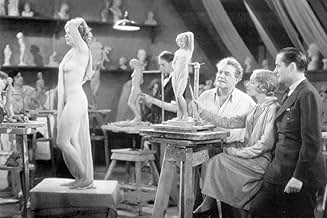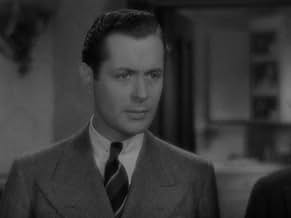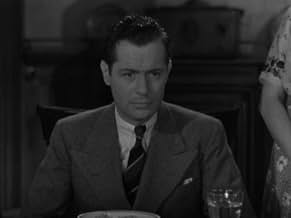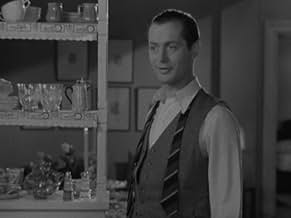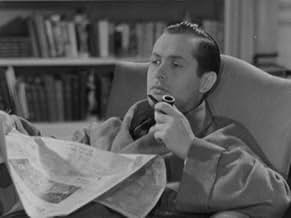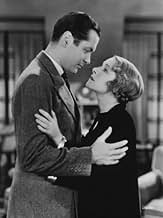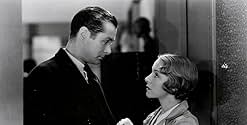A new bride learns she and her husband's stuck-up family don't speak the same language.A new bride learns she and her husband's stuck-up family don't speak the same language.A new bride learns she and her husband's stuck-up family don't speak the same language.
- Awards
- 3 wins total
Julia Bejarano
- Umbrella Peddler
- (uncredited)
William Farnum
- C. Forrester
- (uncredited)
Sherry Hall
- Purser
- (uncredited)
Featured reviews
ANOTHER LANGUAGE is the story of a marriage that suffers because the husband (ROBERT MONTGOMERY) is a self-centered snob ruled by a family that views its mother (LOUISE CLOSSER HALE) as the matriarch of the family who must be paid attention at all costs and smothers Montgomery with motherly affection. I loved the line spoken by HENRY TRAVERS, who tells her at a crucial moment, "Shut up, ma and don't faint. He's not looking."
HELEN HAYES gives one of her more natural performances on film. Very often she was prone to stage acting techniques, but here her manner is subdued and never overplayed. Montgomery is excellent and makes the man a weakling the viewer can never really warm up to until the final moments when he stands by her side.
Rose Franken was an expert at telling stories about family relationships, as she did with "Claudia" and the sequel "Claudia and David". Here she paints a vivid portrait of unpleasant family relationships.
In strong supporting roles, MARGARET HAMILTON and JOHN BEAL repeat their stage roles effectively.
HELEN HAYES gives one of her more natural performances on film. Very often she was prone to stage acting techniques, but here her manner is subdued and never overplayed. Montgomery is excellent and makes the man a weakling the viewer can never really warm up to until the final moments when he stands by her side.
Rose Franken was an expert at telling stories about family relationships, as she did with "Claudia" and the sequel "Claudia and David". Here she paints a vivid portrait of unpleasant family relationships.
In strong supporting roles, MARGARET HAMILTON and JOHN BEAL repeat their stage roles effectively.
Rose Franken, now forgotten, was an estimable playwright of the first half of the 20th century, one of the very few women to reliably write Broadway hits. This is one such hit, a 1932 drama faithfully filmed with much of the original cast, with dialog neatly refashioned by two of MGM's best screenwriters, Herman Mankiewicz and Donald Ogden Stewart. Franken wrote particularly well about family dynamics, and that's pretty much all this is, the story of young marrieds threatened by the groom's unquestioning domination by a catty, conservative family, most especially his horror of a mother, well played by Louise Closser Hale. He's not an especially likable hero, often petty, self-centered, and domineering toward his wife, and Montgomery isn't afraid to emphasize his less attractive traits. So Helen Hayes is left to suffer quietly, trying to maintain her composure as his relatives mercilessly nitpick at her, and crushed every time she attempts to fight back. Hayes is, as usual, sexless, but she effectively catches this woman's desperation, and she partners well with John Beal, quite touching as the nephew who falls in love with her. (What happens to him? After his final exit, I expected to hear an offstage gunshot.) It's economical, swift storytelling, with a bunch of good character actors in support, and their portrayals, thanks largely to the writing, are well-rounded-- nobody's totally awful, except Louise Closser Hale's grasping mama.
There's a good film hiding within "Another Language," but it's overshadowed by an overwrought plot and, most significantly, an unsympathetic central character.
The plot concerns Stella (Helen Hayes), a newlywed whose husband Victor (Robert Montgomery) is blind to his family's boorish behavior and their immediate dislike of his new bride. Worst in the bunch is his smothering mother (Louise Closser Hale), whose reaction in every scene is to pretend to be ill to gain her sons' sympathy. Why none of her stupid children see through her manipulative behavior boggles the mind. Victor (or as his family annoyingly calls him, Vicki) is the most frustrating character in the film. He takes his family's side whenever a conflict arises and treats his wife not only like a stranger, but with disdain. It's a mystery as to what Stella ever saw in him and for that matter, why she hasn't walked out on him. There's also a subplot involving Victor's nephew who falls in love with Stella that is never fully developed, nor is it resolved to a satisfying conclusion.
Another weakness, as someone else pointed out, is that the one family member who shows any compassion toward Stella is Victor's father (Henry Travers), yet he never stands up to his wife or any of the other relatives who are always attacking Stella.
Hayes is acceptable in her role, but it's easy to see why she never became a successful film star. Whatever magic she had on stage doesn't translate to the screen. Her acting is sometimes mannered and she doesn't have a face the camera would fall in love with. She isn't helped by Montgomery, who is just so unlikeable in this film. The two have zero chemistry.
Louise Closser Hale fares better as Mrs. Hallam, the mother-in-law from hell. The standout, though, is Margaret Hamilton in her film debut as one of Stella's sisters-in-law. Though bitchy most of the time, she does show some humanity in the final reels and is the only truly believable member of the family. The movie is only worth sitting for through the performance of this consummate character actor. It's like she's speaking another language compared to the rest of the cast.
The plot concerns Stella (Helen Hayes), a newlywed whose husband Victor (Robert Montgomery) is blind to his family's boorish behavior and their immediate dislike of his new bride. Worst in the bunch is his smothering mother (Louise Closser Hale), whose reaction in every scene is to pretend to be ill to gain her sons' sympathy. Why none of her stupid children see through her manipulative behavior boggles the mind. Victor (or as his family annoyingly calls him, Vicki) is the most frustrating character in the film. He takes his family's side whenever a conflict arises and treats his wife not only like a stranger, but with disdain. It's a mystery as to what Stella ever saw in him and for that matter, why she hasn't walked out on him. There's also a subplot involving Victor's nephew who falls in love with Stella that is never fully developed, nor is it resolved to a satisfying conclusion.
Another weakness, as someone else pointed out, is that the one family member who shows any compassion toward Stella is Victor's father (Henry Travers), yet he never stands up to his wife or any of the other relatives who are always attacking Stella.
Hayes is acceptable in her role, but it's easy to see why she never became a successful film star. Whatever magic she had on stage doesn't translate to the screen. Her acting is sometimes mannered and she doesn't have a face the camera would fall in love with. She isn't helped by Montgomery, who is just so unlikeable in this film. The two have zero chemistry.
Louise Closser Hale fares better as Mrs. Hallam, the mother-in-law from hell. The standout, though, is Margaret Hamilton in her film debut as one of Stella's sisters-in-law. Though bitchy most of the time, she does show some humanity in the final reels and is the only truly believable member of the family. The movie is only worth sitting for through the performance of this consummate character actor. It's like she's speaking another language compared to the rest of the cast.
Another Language from 1933 stars Robert Montgomery, Helen Hayes, John Beal, and Louise Closser. Directed by Edward H. Griffith.
Montgomery and Hayes are Victor and Stella, who fell in love in Europe and eloped. After meeting his family back in the states, she gradually realizes that he's basically smothered by their closeness, and they all dance to the tune of their mother (Closser). She's very manipulative, the type who becomes ill whenever Victor and Stella want to leave town. The family finds Stella upper class and make annoying remarks couched as jokes.
(Note: Robert Taylor's mother was like this. The story is she went on the Taylor/Stanwyck honeymoon-untrue. She delayed it by becoming ill. Barbara referred to her as "that miserable b--.")
To make matters worse, Victor's nephew Jerry (Beal), who is not like the rest of the family, falls for Stella.
Victor needs to stand up for himself and Stella. Will he?
Good film. The cast, which also includes Margaret Hamilton, is very good. She and Beal repeat their Broadway roles. Hayes is lovely as the free-spirited wife who adores her husband but also likes to take art class twice a week.
I met John Beal many years ago. He was a lovely man who had a lot of success on Broadway. As a young leading man, he had a great start in films; postwar he worked more on stage.
Apparently, Norma Shearer was supposed to play the lead, but her husband, Irving Thalberg, had a heart attack, and she decided to stay home.
Montgomery and Hayes are Victor and Stella, who fell in love in Europe and eloped. After meeting his family back in the states, she gradually realizes that he's basically smothered by their closeness, and they all dance to the tune of their mother (Closser). She's very manipulative, the type who becomes ill whenever Victor and Stella want to leave town. The family finds Stella upper class and make annoying remarks couched as jokes.
(Note: Robert Taylor's mother was like this. The story is she went on the Taylor/Stanwyck honeymoon-untrue. She delayed it by becoming ill. Barbara referred to her as "that miserable b--.")
To make matters worse, Victor's nephew Jerry (Beal), who is not like the rest of the family, falls for Stella.
Victor needs to stand up for himself and Stella. Will he?
Good film. The cast, which also includes Margaret Hamilton, is very good. She and Beal repeat their Broadway roles. Hayes is lovely as the free-spirited wife who adores her husband but also likes to take art class twice a week.
I met John Beal many years ago. He was a lovely man who had a lot of success on Broadway. As a young leading man, he had a great start in films; postwar he worked more on stage.
Apparently, Norma Shearer was supposed to play the lead, but her husband, Irving Thalberg, had a heart attack, and she decided to stay home.
These non politically correct movies are the most enjoyable. Although his comedy is best, Robert Monty's drama skills are put to good use in this romantic drama. Snobby family versus down-to-earth daughter in law is predictable but it still works.
Did you know
- TriviaModern sources state that Helen Hayes replaced Norma Shearer in the lead after Shearer decided to stay at home and nurse her husband, Irving Thalberg, who had suffered a serious heart attack.
- GoofsWhen Sally is pouring coffee for Victor, she gets distracted and spills some - it splashes out of the saucer and onto the tablecloth. However, in the next shot where she switches cups with Victor, there is no evidence of the spilled coffee on the tablecloth.
- Quotes
Mother Hallam: [Victor has left the house against his mother's wishes] Victor! Come back here!
[she swoons]
Pop Hallam: Don't bother to faint, Mom, he can't see you.
Mother Hallam: [suddenly alert, and very irritated] Shut up!
- Crazy creditsIn the beginning credits portraits of the actors who portray the main characters are shown with a hand flipping through a photo album of the Hallam Family.
- ConnectionsFeatured in This Side of Heaven (1934)
- SoundtracksThe Wedding of the Painted Doll
(uncredited)
Music by Nacio Herb Brown
Lyrics by Arthur Freed
Played on the Victrola
Details
Box office
- Budget
- $272,297 (estimated)
- Runtime
- 1h 17m(77 min)
- Color
- Aspect ratio
- 1.37 : 1
Contribute to this page
Suggest an edit or add missing content

